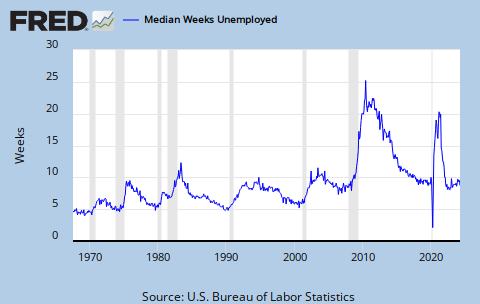What some folks, like Paul Krugman (h/t Eschaton), are saying is that something like this applies to other things, such as unemployment rates:
Right now, I’m reading Larry Ball on hysteresis in unemployment (pdf) — the tendency of high unemployment to become permanent. Ball provides compelling evidence that weak policy responses to high unemployment tend to raise the level of structural unemployment, so that inflation tends to rise at much higher unemployment rates than before. And the kind of unemployment we’re experiencing now, with many workers jobless for very long periods, is precisely the kind of unemployment likely to leave workers permanently unemployable.And this is precisely what is happening in the US. Check out this graph of the median duration of unemployment in that country:

There seems to be a sort of "ratchet effect", where even after the recessions (shown in grey) have ended, the median duration of unemployment increases. And what's happened in the last couple of years is something else again. The effect of this on a society cannot be good...
No comments:
Post a Comment